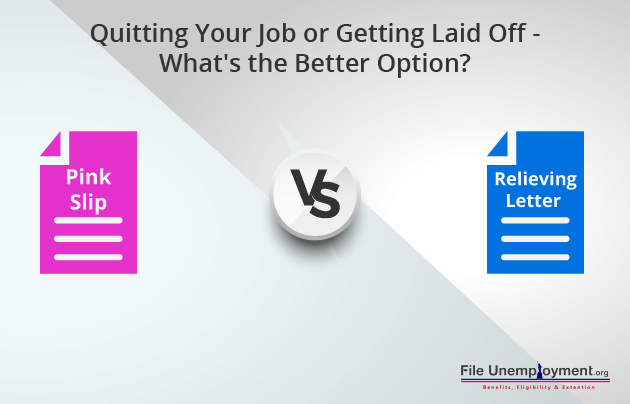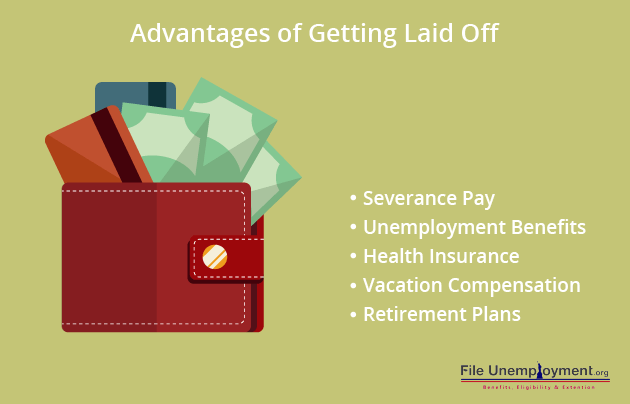There’s a lot of upheavals taking place in the organization and a round of layoffs have been happening. Decide if you need to quit your job or if you should leave your job.
Your workload is shrinking and other people’s positions are being slashed. You feel you’re being excluded from meetings and that you might just be the next in line to get the pink slip.

You’re faced with a question, “Should you quit your job on your own terms or wait for the company to decide your fate?”
Each of the situations has its own advantages. But as an employee, you need to draw the fine line between staying loyal to your current company and making the wise decision to move on
Advantages of Quitting Your Job
In some situations, quitting your job willingly can be beneficial as it helps you approach an interview with more confidence. Candidates who get laid off tend to lack confidence when they attend interviews, even though the reason due to which they were let go is usually not their fault.
Interviewers have the habit of asking the interviewing candidate their reason for leaving the previous job. This question is almost always asked regardless of the position to be filled.
When a candidate leaves a job voluntarily as against being laid off, it becomes easier to take on this question and answer it. Candidates find it easier to say that they took a conscious decision to quit their job and move on rather than having to admit they were let go of even if it was without a cause.
Speaking along these lines, quitting your job voluntarily makes it a smoother emotional transition between jobs. The fact that one gets to make their own decisions and has not been handed over their fate, makes them feel like they’re in control of the situation.
This helps the person feel empowered during their job hunt instead of feeling the desperation that could be accompanied by losing a job.
By quitting your job, you could be saving your current company from the difficult task of firing you and also save on unemployment benefits. You could also probably negotiate a notice period that gives you sufficient time to look out for other opportunities.
Maybe you can even ask for a viable recommendation or two. Mention it to your employer that you will continue to maintain a positive attitude with the company until your last day.
Advantages of Getting Laid Off
From what we have weighed so far, quitting your job seems to have quite a few benefits when compared to anxiously awaiting a layoff.
Quitting a job, however, makes you miss out on certain benefits that come with being laid off.
What are the benefits you gain when you are laid off?
- Severance pay
- Unemployment benefits
- Health insurance through COBRA
- Compensation for the remaining vacation days
- Possible deferred compensation like retirement plans, stock options, pension.
Your unemployment checks will not completely replace your paychecks. Nonetheless, if you’re a middle or low earner it could help you pay your bills until you find alternate employment.
In most states, one can draw unemployment benefits up to 26 weeks. In Massachusetts, unemployment benefits could amount to as much as $1,103 and extend up to 30 weeks.
Check the maximum weekly benefits in your state. So if finances are a concern to you, it might just pay off to wait until you get laid off.
The financial support that accompanies a layoff relieves you from the burden of paying bills and staying afloat. It also gives you time to look for the right job.
If you are stressed out about money, it’s likely that you will jump towards the first offer that comes your way. A little financial support to help you sustain, you can take a little time to search for jobs and also approach the situation from a more level-headed outlook.
To Quit or Not to Quit
Making a decision about whether waiting to get laid off or quit before the situation arises can be a tough decision. Here are some reasons to stay on in the job and also situations in which you should probably quit before you are handed over the pink slip.
Read on to help yourself make a composed decision and not a hasty one:
Reasons to Stay on the Job
A few good reasons for you to continue with the company are:
- Candidates tend to be more confident while networking and interviewing when they are still employed
- It is relatively easier to get hired while you still have a job than when you are out of work
- You could probably start applying for jobs while you’re still working so that you can avoid the question about why you quit or having to tell your interviewer that you were laid off
Situations in which You Should Consider Leaving
Employees tend to get a little too comfortable in their positions and build emotional bonds with their companies. This is especially common in situations where the employee enjoys their job.
Such employees tend to stick on to the company even when the company is sinking instead of looking out for other jobs. Another reason for employees not to begin their job search is laziness.
The second situation in which you should consider leaving is if the job is affecting your mental health in a negative way. If the stress and anxiety of getting laid off are affecting your work life, your everyday activity or your confidence, quitting could help you.
You could put down your papers and try to negotiate for a sufficient notice period and start your job search at the same time. The one disadvantage that you need to be prepared for though is that they may ask you to leave immediately without serving a notice period.
How to Prepare?
The feeling of not being in control of the situation can always be stressful, but preparation can make things easier. Update your resume and start applying.
The best case scenario would be that you’ll get a job offer soon after you put down your papers. In the worst case scenario, you could be let go.
But hey, you’ll be prepared for it as you would have already updated your resume and begun the job search. Then there’s always the severance pay and unemployment benefits to look forward to.
If you haven’t attended an interview in a long, here are some interview tips that you could use to brush up on your interview skills. Browse through our site and view the unemployment benefits for different states.


